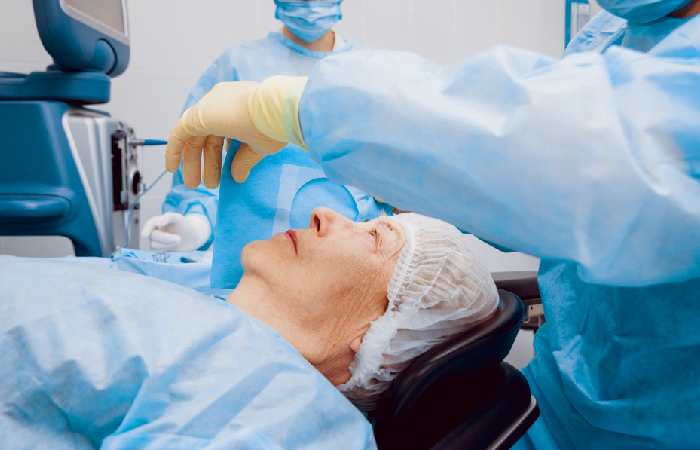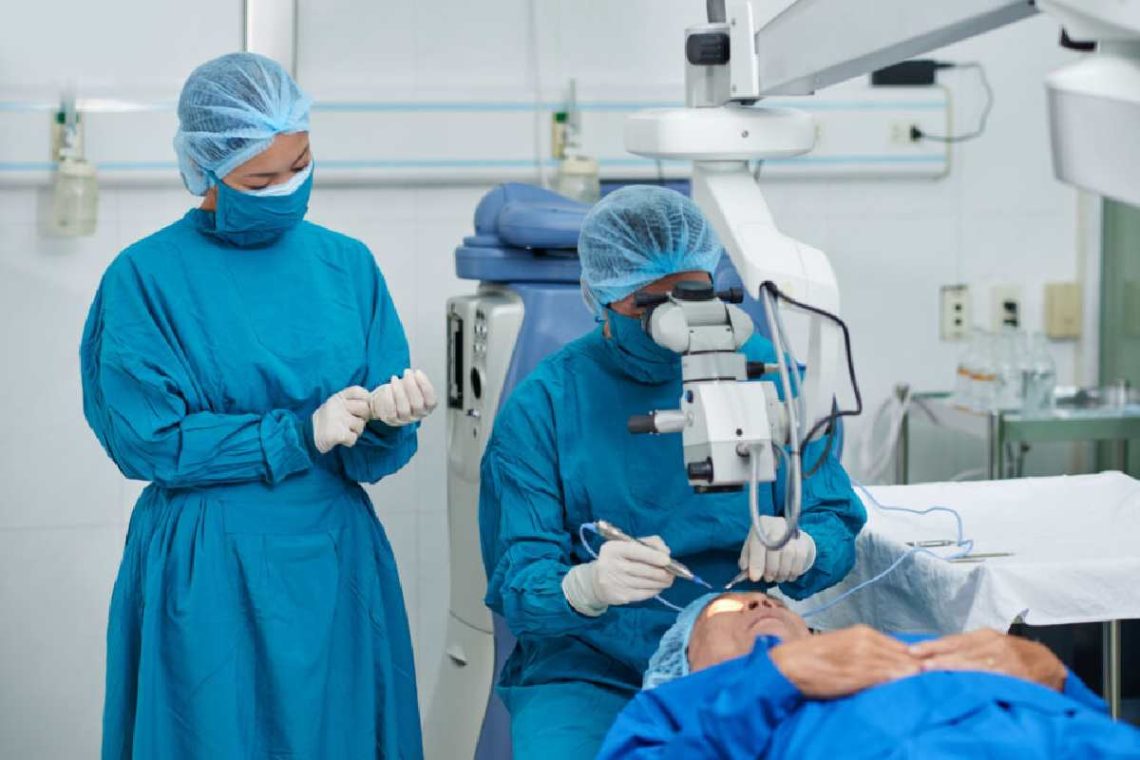Are you wondering, ” how long between cataract surgery on each eye?” and curious about the optimal recovery time? This article explores the recommended interval between cataract surgeries for each eye.
What is better for treating cataracts: how long between cataract surgery on each eye, operating on both eyes on the same day or on different days?
Cataracts or blurred vision is a typical problem of aging that usually affects both eyes. To solve this problem, the natural eye lens, which has gradually lost transparency, must be replaced by an artificial one. The question is: how long between cataract surgery on each eye? Is it better to operate on both eyes simultaneously or on different days?
In this post, we answer this question and explain the answer step by step :
How long between cataract surgery on each eye?
Answer
Typically, doctors recommend waiting about 1 to 3 weeks between cataract surgeries on each eye. This interval allows the first eye to heal properly and ensures that any complications can be addressed before proceeding with the second surgery. Your eye doctor will provide specific guidance based on your individual condition and recovery progress.
Current evidence suggests that there may be no significant differences between having cataract surgery performed on both eyes on the same day or different days regarding the risk of infection inside the eye, vision loss of more than one diopter, and other complications.
Key messages
Cataract surgery on both eyes on the same day has advantages (such as fewer hospital visits and a single recovery period) and disadvantages (possible complications in both eyes, the experience from the first operation cannot be carried over into the second operation).
Patient values and preferences are essential in deciding which option is best.
How to Prepare for Cataract Surgery
- Visit your eye doctor for tests.
- Use special eye drops as prescribed.
- Stop taking certain medicines if instructed.
- Do not eat or drink the night before.
- Clean your eyelids and eyelashes.
How long does cataract surgery last? What is recovery like?

Below, we will inform you about the timing of cataract surgery and provide recommendations for the postoperative period .
Before cataract surgery
An accurate preoperative diagnosis of other possible eye diseases will allow doctors to adopt the appropriate therapeutic measures to achieve the best results. The eye specialist carried out the biometric measurements with an elevation tomograph surveyor (Oculus Pentacam) and optical coherence biometers (Zeiss IOLMaster) and optical interferometry (Haag-Streit Lenstar). These instruments and the Ray-Tracing calculation methodology will allow doctors to select the most appropriate intraocular lens for each patient accurately.
Preparation phase
In the preparation phase, the optician will apply eye drops shortly before the operation to dilate the pupil. Just before starting, the eye will be irrigated with abundant antiseptic (to sanitize the eyelids, eyelashes, and conjunctival fornices), and An ophthalmologist will put drops of anesthetic eye drops.
During cataract surgery
During cataract surgery (a few minutes), the eyelids will be opened and held by a separator. The patient will only see a light bulb, without appreciating the details of what is happening. The eye will continuously receive lubricating and anesthetic drops, so that it does not feel any pain.
The corneal microincision will be positioned in the most curved meridian of the cornea, to counteract corneal astigmatism; and then the capsulorhexis (a circular opening in the anterior capsule of the lens) will be performed, which will give access to the contents of the lens.
In cataract surgery, the cloudy contents of the lens are dissolved and aspirated, replacing them with a premium intraocular lens. The corneal microincision does not need stitches; thanks to its valved architecture, it closes on its own due to the effect of intraocular pressure, so you will fully recover from the cataract operation in a short time.
What happens after cataract surgery?
At the end of the operation, you will leave the operating room alone with your eyes uncovered. During the first few hours, vision will be slightly blurred, and minor discomfort, such as stinging and a foreign body sensation, is expected. The day after the operation, you feel much better. With practically no discomfort and much clearer vision, and will be able to return to her usual tasks very soon.
Tips to follow after cataract surgery
The recovery time from cataract surgery is short, but it is advisable to follow specific recommendations:
- During the first few days, do not rub your eyes and dry your face carefully without pressing too hard after showering.
- You can strain your eyes as soon as you notice that you are seeing better. Watching television, reading, driving, or using the computer does not harm you.
- During the first days, you should move gently and avoid intense physical effort, but you can bend down and carry light packages (up to 10 kg) from the first moment after cataract surgery.
- It is very important that you use the eye drops as often as we indicate and that you wear protective glasses. when you are in the sun or when there is a lot of wind.
- Your vision will progressively improve; slight variations are expected during the healing period.
- Go to all postoperative check-ups, even if you feel well and believe they are unnecessary.
What are the risks of cataract surgery?
Cataract surgery is one of the most common, safe, and effective types of surgery in the United States. However, as with any surgery, there are risks. For example:
- Swelling, bleeding, or infections
- Loss of vision or double vision
- Unusual changes in eye pressure
- Retinal detachment
- Secondary cataract (posterior capsule opacity)

